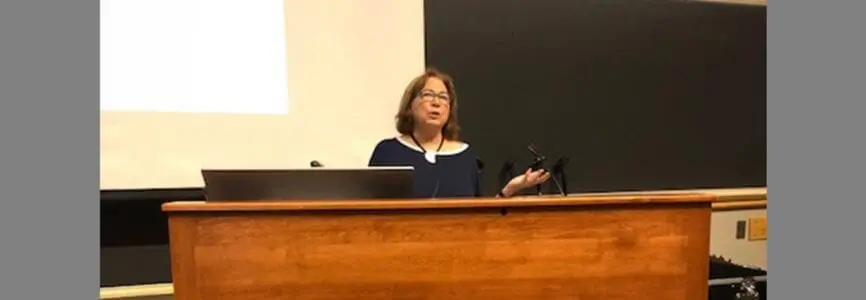Hastings Center News
Hastings President Calls Attention to Public Engagement in Setting Science Policy
Genomics, new forms of assisted reproduction, neuroscience—these and other technologies give us transformative powers that we are just starting to realize. Nearly every report or commission that seeks to inform the responsible use of such biotechnologies ends with the same recommendation: we must involve the public. But what does “public engagement” mean in practice? Who should count as a stakeholder, and what should happen when large numbers of the public deny scientific evidence?
“Scientists and other kinds of experts, like bioethicists, cannot alone make the decisions that must be made,” said Hastings Center president Mildred Z. Solomon, who gave a plenary talk, “Bioethics, Public Engagement, and Civic Discord,” on June 8 at the 2018 Harvard Clinical Bioethics Course. Solomon is also a professor (part-time) of Anaesthesia and the director of the Fellowship in Bioethics at Harvard Medical School.
While technical expertise informs how biotechnologies can be used, publics must be involved in deliberation about how they ought to be used, said Solomon. Calling for increased attention to public engagement is a recognition that a democratic society requires robust discussion among its citizens to solve collective problems, especially when important value questions are at stake.
She told the audience of about 200 people what is known about public engagement, summarizing a set of essays published in the Hastings Center Report. The report identifies three essential elements of public deliberation: the provision of balanced, factual information that improves participants’ knowledge of an issue; the inclusion of diverse perspectives; and the opportunity for participants to freely discuss a wide spectrum of viewpoints and to challenge competing values and claims.
Next, Solomon laid out a series of questions, showing where there is still great uncertainty and debate about what public engagement is and what it should be. “It is a huge global problem that we have these powerful technologies, but we have no concerted, and certainly no coordinated, way to guide their use,” she said, reflecting on her talk. “If democracy requires public engagement to guide their use, we need to figure out what we mean by public engagement. What potential purposes to which a technology is going to be used warrant oversight and public scrutiny? Who is the public? The local community being affected, various stakeholders, or more distant publics who, while not directly affected, may nevertheless have an important stake – such as citizens worried about the loss of species? And what happens when the public is unduly afraid or skeptical about science: whose authority – experts or the public- should hold sway?”
Solomon is a principal investigator for a new Hastings Center project, “How Should the Public Learn? Reconstructing Common Purpose and Civic Innovation for a Democracy in Crisis.” Learn more about the project.

